Mastering Blackjack: Understanding the Odds of Winning
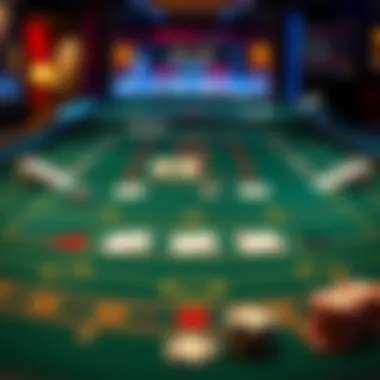

Intro
In this article, we’ll unravel the nuanced aspects of blackjack strategies and delve deep into the mechanics that govern the game. From betting strategies that can affect your pursuit of fortune, to tips that sharpen your skills, you’ll walk away with a comprehensive understanding that may just give you the edge you need on the BetsVaults platform.
As we go through the sections, you’ll discover expert insights and statistical analyses that bolster your grasp of the game. You’ll also find gaming strategies ranging from the basic to the more advanced, ensuring there’s something valuable here for everyone who enjoys gambling.
Let’s plunge into the heart of the matter and see how we can better your chances at the blackjack table.
Betting Strategies
One of the most crucial elements in blackjack is the right betting strategy. Your choices with your chips can make or break your gaming experience. Therefore, understanding the various betting strategies available is imperative.
Types of Betting Strategies
Several types of betting strategies exist, each with unique philosophies and techniques. Here are a few that stand out:
- Martingale System: This method suggests that after every loss, you should double your wager. The idea is to recover all previous losses when you finally win. While it sounds enticing, it can be risky if you hit a losing streak.
- Paroli Strategy: Quite the opposite of Martingale, the Paroli Strategy involves progressively increasing your bet after every win. This method aims to capitalize on winning streaks while limiting losses.
- Flat Betting: A straightforward approach, flat betting involves wagering the same amount regardless of the outcome. This method is less risky, keeping your bankroll more stable, but may not maximize winnings during hot streaks.
"Bet with your head, not over it."
By carefully selecting your strategy, it becomes easier to navigate fluctuations in your luck. Each strategy carries its own weight and risk, so it’s important to evaluate which fits your style.
Evaluating Betting Odds
Unearthing the odds of various situations in blackjack can help in crafting your game strategy. The odds often remain in the house’s favor in the long run, but they're not unbeatable. A few considerations include:
- The basic house edge in blackjack generally hovers around 0.5% when using optimal strategy, far better than many other casino games.
- Certain variations of blackjack, such as Blackjack Switch or Spanish 21 can tilt the odds slightly in your favor, while others may increase house advantage.
Being aware of these odds can help guide your betting decisions, possibly leading to more favorable outcomes.
As you plot out your gameplay, consider the intersection of luck and strategy as you devise your approach. The path of a skillful blackjack player isn’t set in stone; it requires flexibility, adaptability, and an understanding of how your bets shape each round you play.
Foundations of Blackjack
The foundations of blackjack are pivotal as they shape the entire landscape of the game. Grasping these fundamentals equips players with the necessary tools to not only enjoy the game but also to enhance their chances of winning. Understanding the core elements provides insight into the strategies that can be employed later on. Every successful blackjack player knows that mastery of the basics is where it all begins.
The Objective of the Game
At its heart, the objective of blackjack is straightforward: players aim to beat the dealer by having a hand total that is as close to 21 as possible without exceeding it. The allure of the game lies in striking a balance between risk and strategy. Players start with two cards, and they can choose to receive additional cards or stand based on their hand and the dealer's visible card. This strategic layer adds depth to the game, making it more than just a simple draw of cards. The thrill stems from making calculated decisions that influence the outcome.
Basic Rules and Setup
Understanding the basic rules is essential for anyone interested in diving into blackjack. The game typically uses one or more decks of standard playing cards. Initially, each player, including the dealer, is dealt two cards. While players can see both of their cards, the dealer has one face up and one face down, creating an element of uncertainty. Players have several actions available:
- Hit: Take another card to improve hand value.
- Stand: Keep current hand and end turn.
- Double Down: Double the initial bet and get one more card.
- Split: If the first two cards are of the same value, split them into two separate hands.
Each choice carries risks and rewards, emphasizing the importance of understanding when to take action. The nuances of these rules are what separate novices from pros, as seasoned players will adapt their strategies based on the table's dynamics.
The Role of the Dealer
The dealer plays a crucial role, acting as the game's arbiter. Unlike players, they follow a strict set of rules regarding how to play their hand. When it’s the dealer's turn, they will automatically hit until their cards total 17 or higher. This creates an interesting tension between the players' hands and the dealer's, adding another level of strategy for the players. Understanding the dealer's limits and tendencies is vital.
"The dealer's visible card is often a critical cue. If they show a 6, for instance, players are more likely to take risks. Knowing when to play it safe or go all in can spell the difference between victory and loss."
In summary, comprehending the foundations of blackjack—from the game's objectives to the intricacies of the dealer's role—sets the stage for more advanced strategies and better decision-making. This foundational knowledge will be pivotal as players navigate through various strategies and variations related to blackjack.
For further exploration of blackjack basics, resources like Wikipedia or Britannica provide additional depth and historical context.
Calculating Odds in Blackjack
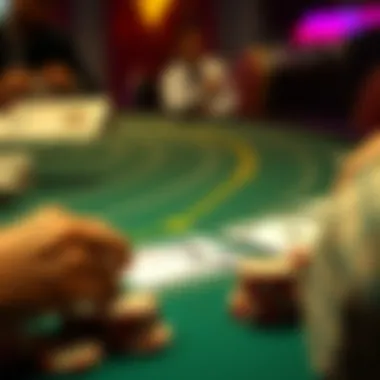
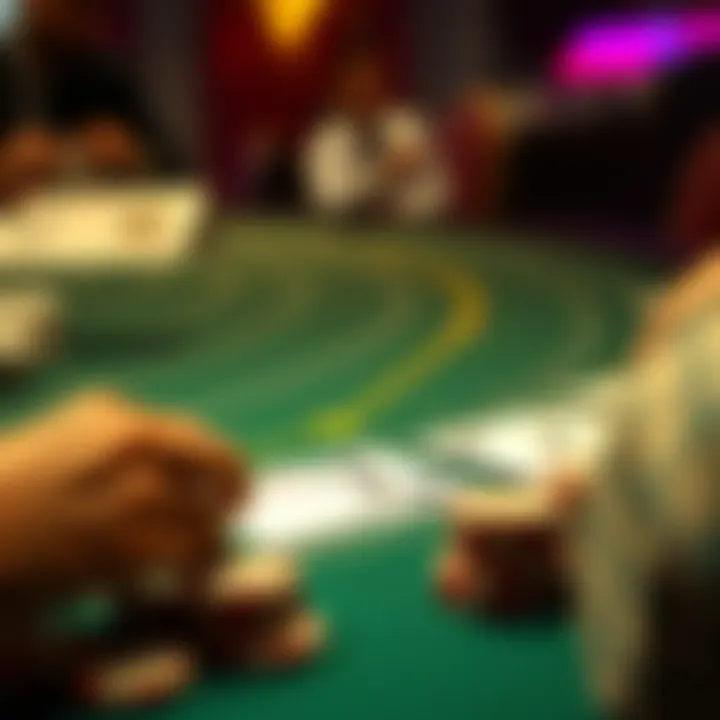
Understanding the odds in blackjack is like having a cheat sheet that helps you make informed decisions at the table. The calculations around odds are not just theoretical; they are practical tools that every player should have in their back pocket. These calculations provide insight into the likelihood of various outcomes, helping players to adopt strategies that can sway the game in their favor. In blackjack, where chance and strategy collide, knowing the math behind your moves significantly impacts your overall gaming experience.
Understanding Probability
In the gambling world, probability is king. It offers a framework for predicting the likelihood of winning hands, busts, and receiving certain card combinations. At its core, the probability in blackjack relies on the simple question: What are the chances that my hand will beat the dealer's?
To grasp this effectively, let’s consider the basics:
- There are 52 cards in a standard deck.
- The cards rank from 2 to Ace, and certain cards, namely 10s, Jacks, Queens, and Kings, are worth ten points.
- When calculating the odds, one systematic approach is to consider how many possible winning hands you could have compared to the total hands possible.
For instance, if you have an 8 and a 5, your total is 13. To reach 21, you'd want either an 8, a 7, an Ace, or some combinations thereof, making your strategy flexible. Each card’s value plays a role in the overall probability of hitting 21 or busting.
"The beauty of blackjack lies in the balance of luck and skill, where a firm grasp of probability can turn tables in your favor."
House Edge Explained
The house edge, often viewed as the villain in a player's journey, is essentially the casino's built-in advantage over the players. In blackjack, this edge usually hovers around 0.5% to 2% depending on the specific rules of the game and the strategies employed.
Why does this matter? The house edge means that over time, you can expect to lose a little more than you win; however, understanding how it works allows you to minimize losses.
Factors influencing house edge include:
- Number of decks: More decks generally increase the house advantage.
- Rules about splitting and doubling down: Rules that favor the player can decrease the house edge.
- Dealer's rules: If the dealer must hit on soft 17, it usually increases the casino's advantage.
By being aware of these factors, players can choose games that offer better odds and adjust their strategies accordingly. Keeping an eye on these nuances can help you exploit the house edge effectively.
Impact of Deck Number on Odds
The number of decks in play can dramatically sway the context of your odds. Many casinos use multiple decks for various reasons, mostly to complicate card counting and bolster their edge over players.
In a single-deck game, for example, players can enjoy a lower overall house edge, making it more favorable to know basic strategy. On the flip side, multi-deck games can dilute your chances of hitting that perfect hand. As a result, players might face a situation where they are less likely to be dealt favorable card combinations.
To break it down further, consider this:
- Single Deck: Players have better chances of hitting blackjack (about 0.5% higher than in a six-deck game).
- Multi-Deck Variations: Odds of drawing specific cards adjusts since there are more of each card in circulation, making situations less favorable.
Understanding how the number of decks influences your odds can make an enormous difference in your gameplay strategy. Choosing wisely where to place your bets is half the battle in blackjack.
Winning Strategies
When it comes to blackjack, mastering the odds isn't just about the cards you are dealt; it’s also about the strategies you employ. Winning strategies are critical as they can significantly change the outcomes over time. Whether you are a novice stepping into the casino for the first time or a seasoned player aiming to refine your game, understanding these tactics can be the difference between exiting with a profit or a diminished bankroll.
Basic Strategy Charts
Basic strategy charts might seem like simple tools, but they are grounded in mathematical principles that help players make the best decisions based on their hands and the dealer's upcard. Essentially, these charts provide guidance on whether to hit, stand, double down, or split based on the total value of your hand and what the dealer shows. For instance, if you have a hand totaling 16 and the dealer displays a 10, the chart might indicate to hit, even if the prospect of busting seems likely.
This approach minimizes the house edge and optimizes your chances over many rounds of play.
Here is a brief example of how a basic strategy would work:
- You have 8 and 7 (Total 15), Dealer shows 10: Hit
- You have 9 and 8 (Total 17), Dealer shows 6: Stand
By relying on these charts and familiarizing yourself with their layout, you can make informed decisions that align with optimal gameplay. This not only enhances your understanding of the game but can also boost your confidence at the table.
Card Counting Techniques
Card counting often conjures images of high-stakes players seated at a dimly lit table with a cunning edge. However, in essence, it is merely a method of tracking the ratio of high cards to low cards still in the deck, which helps players gauge when the odds might swing in their favor. While many people associate card counting with advanced strategy, at its core, it is quite straightforward.
For example, you can assign values to cards: +1 for low cards (2-6), 0 for middle cards (7-9), and -1 for high cards (10-Ace). As the game progresses, you maintain a running count. The higher the count, the more favorable the deck is for the player.
However, it's important to remember that while card counting is a legitimate technique, many casinos keep a keen eye on potential counters, which can lead to ejection from play. If you decide to pursue this method, practice is key.
Bet Sizing and Your Bankroll
Effective bet sizing is another crucial aspect when strategizing for blackjack. Your bet should be proportional to your bankroll, ensuring you can withstand fluctuations while also capitalizing on favorable conditions. For example, a common approach is the 5% rule where players should never wager more than 5% of their total bankroll on a single hand. This way, even a string of losses won’t cripple your playing ability.
Additionally, consider adjusting your bet size according to the count you’ve been tracking. If the count favors the player, increasing your bet slightly might yield greater profits. Conversely, during unfavorable counts, you can lower your bet to conserve funds.
In essence, balancing your risk while strategically sizing bets can enhance your ability to withstand the unpredictable nature of blackjack.


By combining these strategies - basic charts, card counting, and careful bankroll management - players improve their chances of winning and enhance their overall experience in the game.
Blackjack Variations and Their Odds
In the realm of blackjack, variations can be both a boon and a bane, affecting the gameplay and the odds in significant ways. Each version of blackjack comes with its own rules and nuances, which can create a ripple effect on strategies for winning. For the discerning player, understanding these differences allows for more informed decisions, tailored strategies, and ultimately, a better gaming experience.
European vs. American Blackjack
The primary distinction between European and American blackjack lies in the dealer's upcard and how the game is structured. In American blackjack, the dealer receives two cards, one face up and one face down. This additional card transforms the strategy significantly, providing players with the chance to modify their game based on visible information. Conversely, in European blackjack, the dealer only receives one down card until after all players have finished their hands.
The gameplay changes approach towards hitting or standing. Players might find themselves more prudent in European blackjack, due to the uncertainty of the dealer's potential hand. The house edge in these two forms can vary slightly, with European typically having a lower edge due to the lack of the dealer bust rule when showing their second card during play.
"In the game, knowledge can be as powerful as the cards in your hand."
Understanding when to bet and how these variations affect your odds is paramount. Choosing to play European might suit a more conservative strategy while American may tempt players into riskier plays, influenced by that exposed dealer card.
Single Deck vs. Multi-Deck Games
When talking about the number of decks used, the house edge decreases as the number of decks lowers. Single deck blackjack offers players the best odds and more favorable opportunities for card counting. In these games, many players find themselves leaning towards hitting on higher-risk hands, having more information about which cards remain in play.
In contrast, multi-deck games, often preferred by casinos, generally increase the house advantage. With more decks in play, it becomes increasingly challenging to track the card flow. Players might notice they hit 20 more successfully in single deck propositions compared to a multi-deck setup.
- Benefits of Single Deck Games:
- Disadvantages of Multi-Deck Games:
- Better odds for players.
- More effective for card counters.
- Increased house edge.
- Harder to count cards efficiently.
Side Bets: Risk vs. Reward
Side bets add a layer of excitement and potential payout, yet they often come loaded with caveats. Common side bets might include options like the Perfect Pairs or 21+3. While these bets can yield higher returns, they come with a heavier house edge than standard blackjack wagers.
For instance, the Perfect Pairs side bet pays out if a player’s first two cards are a pair. The allure of a significant return might be tempting; however, understanding that the odds of hitting these hands don’t favor the player is crucial.
A few considerations players should keep in mind:
- Side bets can increase overall risk exposure.
- Evaluate the potential vs. actual payout ratio carefully.
- Always prioritize your main strategy before engaging in side bets.
Psychological Aspects of Blackjack
The game of blackjack isn't just a test of luck; it's also a battleground for the mind. Understanding the psychological aspects of blackjack is crucial to navigating its complexities. In this section, we take a closer look at how various psychological elements play a role in the game, the benefits they offer when understood, and the factors to consider for a more strategic approach. The interplay between psychology and strategy can make the difference between a loss and a win, highlighting just how significant mindset can be in gambling.
Understanding Player Behavior
Players come to the blackjack table with myriad motivations, emotions, and levels of experience. A newbie might sit down hoping for a beginner's luck, whereas a seasoned player approaches with a calculated mindset, armed with strategies and experience. Observing player behavior is essential for anyone serious about improving their odds.
The table often serves as a melting pot of personalities. Some players are naturally more aggressive, opting for riskier moves, while others play conservatively, opting for safer bets. Recognizing these styles can provide insight into how different decisions may unfold based on collective player actions. For instance, if a player is consistently hitting on lower hands while another is folding, this gives everyone a peek into the psychological state of their rivals—not to mention the environment that the dealer and the players together create at the table.
Furthermore, behavioral patterns can also signal when to adjust your own strategy. Keep an eye out for tendencies in fellow players; who knows, you might be able to exploit a weakness in the table’s dynamics.
The Role of Emotion in Decision Making
Emotion plays a pivotal role in decision-making at the blackjack table. While some players can be cool as cucumbers, others might be riding a rollercoaster of excitement or frustration. This emotional state can cloud judgment, leading to less than optimal decisions.
For instance, after a series of unfortunate hands, a player might become impulsive, making rash bets in hopes of recouping losses. This is often referred to as “chasing losses,” and it’s a dangerous game that many fall into. Recognizing the effects of emotion can enable a player to take a step back, breathe, and reassess their strategy instead of getting swept away in the moment.
A practical tip is to set emotional boundaries before playing. Establish limits on how much you are willing to lose or win and stick to them. It helps to have a pre-determined plan that is devoid of emotional influence. Remember, the more you can detach from that emotional rollercoaster, the sharper your decision-making will be.
Reading the Table Dynamics
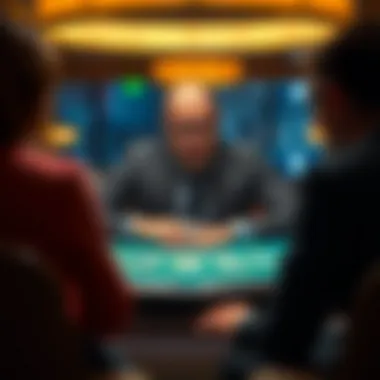
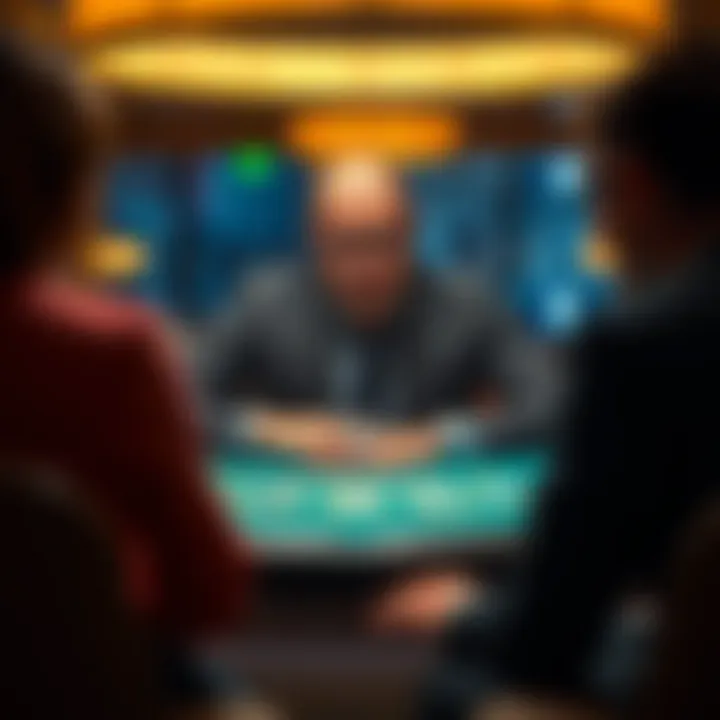
Understanding the table dynamics is like deciphering the lyrics of a heartfelt ballad. Each player’s actions, bets, and demeanor provide clues to the underlying psychological game at play. Reading these cues can empower a savvy player to adapt and respond to the ebb and flow of the game.
For example, observe how the dealer interacts with the players. Is there a more relaxed vibe, or does a tense atmosphere prevail? It can often reflect the feelings of the players at the table and thus guide your strategy. Are players laughing and chatting, or are they focused and quiet?
Moreover, pay attention to how other players react to wins and losses. If one player celebrates a small win while another continually sighs over losses, it might indicate their comfort levels and strategies. By interpreting these subtleties, you can better position yourself for success.
A key takeaway is to blend your own strategy with insights gained from observing others. Adaptability at the table can turn the tide in your favor.
Being astute in emotional and behavioral cues prepares you not only to navigate the game more effectively but also positions you to foster an environment that works in your favor. Each decision is as much about mindset as it is about cards, revealing the multifaceted nature of blackjack beyond the mere numbers. By honing your psychological acumen, you elevate your play and enhance your overall gaming experience.
Legal and Ethical Aspects of Blackjack
The world of blackjack is not just about the cards and the strategies. It's also deeply intertwined with a framework of legal and ethical considerations that can affect everything from how games are run to how players engage in them. Understanding these aspects is crucial for anyone who takes their seat at the table, whether they are casual players or seasoned pros.
In many ways, the legal structure offers protections for both the players and the casinos. It establishes rules that help ensure fairness and integrity in games, serving the dual purpose of enhancing the player experience and maintaining the reputation of the gambling industry. This section delves into the specific regulations and standards that govern blackjack, exploring how they shape the playing environment and what players should be aware of as they navigate this complex landscape.
Regulations and Standards
The regulatory framework surrounding blackjack varies greatly depending on the jurisdiction. Different regions may have distinct laws governing not only the operation of casinos but also player conduct, advertising practices, and even the payout odds for certain games.
- Licensing Requirements: In many areas, casinos must obtain licenses to legally operate. This involves rigorous scrutiny, ensuring that they adhere to standards that protect players and promote fair play.
- Game Integrity: Regulations often mandate regular audits and checks of gaming devices and practices. This ensures that games are not rigged and that players have a fair shot at winning.
- Gambling Age: It is vital to understand the legal gambling age in your region. In most places, playing before reaching the minimum age can lead to penalties for both the player and the casino.
- Anti-Money Laundering (AML) Laws: These laws are in place to prevent illicit activities. Casinos often implement strict identity verification processes to comply with these regulations.
Understanding these regulations not only safeguards players but also reinforces the legitimacy of the gambling industry as a whole. Compliance with laws enhances trust towards casinos, creating an environment conducive to responsible gambling.
Fair Play and Ethics in Gambling
Beyond the legalities, ethical considerations in gambling add another layer of complexity. Ethical gambling promotes positive player behavior, shaping the conduct both at the tables and within the broader community. It's about more than just avoiding deception; it's about fostering an environment where players can enjoy the game responsibly and equitably.
"The integrity of the game relies not just on the rules, but on the players' commitment to uphold them."
- Respect for Other Players: Blackjack is not only a game of chance but also one of human interaction. Players should conduct themselves respectfully at the table, keeping in mind that everyone is there for a fair shot at winning.
- Responsibility: Players should acknowledge their limits and manage their bankroll wisely, understanding that gambling can be addictive. Following this ethical guideline helps maintain the spirit of the game and ensures prolonged enjoyment without jeopardizing financial stability.
- Transparency in Gameplay: Players are encouraged to seek out and play in casinos that prioritize transparency. Understanding game rules, pay tables, and dealer actions lays the groundwork for fair play.
Ethical behavior cultivates a more enjoyable and less stressful environment for all participants. From understanding the rules to respecting fellow players, engaging in ethical gambling can contribute positively to the overall experience in blackjack.
In summary, the legal and ethical aspects of blackjack form the backbone of a fair and enjoyable gaming experience. The interplay of regulations and ethical practices helps maintain the integrity of the game, fostering a culture where all can appreciate both the skill involved and the sheer enjoyment that blackjack brings.
Future of Blackjack
The future of blackjack stands at the crossroads of traditional gaming and a digitally-driven era. As we observe trends shaping other facets of life in the 21st century, it becomes evident that this card game is also undergoing significant transformations. Understanding where blackjack is headed provides valuable insights not only for gamblers but also for casinos, marketers, and technology developers.
Emerging Trends in Online Blackjack
In the past few years, online blackjack has surged in popularity—much like a tide rolling in steadily. Players are no longer confined to the wooden tables of physical casinos. Instead, they’re tapping away on devices from their own living rooms. This dramatic shift is not merely about convenience. It encompasses a variety of trends that are shaping how the game is played:
- Live Dealer Games: Players crave the authentic feel, and live dealer games deliver just that. With real croupiers streaming from studios, the experience becomes more immersive.
- Mobile Gaming: More folks are choosing to play on their phones and tablets. Developers keep optimizing for mobile platforms to meet this demand. Thus, better interfaces lead to smoother betting experiences.
- Social Gaming: Gamblers increasingly want an interactive experience. Online platforms are integrating social features that enable players to communicate, share strategies, or even challenge each other in real time.
These trends signal a shift in player expectations. They’re looking for experiences that blend gaming with social interaction, all while enjoying the thrill of blackjack.
Technological Advancements and Their Impact
The advancements in technology are setting the stage for new possibilities in blackjack. There's plenty of innovation happening behind the scenes, and it extends far beyond graphics and user interfaces. Several noteworthy elements deserve attention:
- Artificial Intelligence (AI): AI is providing personalized experiences. Predictive algorithms analyze player behavior, customizing suggestions and incentives based on habits and preferences.
- Blockchain: The introduction of blockchain technology could enhance transparency and security. Players may find assurance knowing transactions are recorded securely, mitigating fraud and enhancing trust.
- Augmented Reality (AR): Imagine being able to interact with a virtual table from your home while the cards are dealt in a real environment. AR offers an exciting blend that may attract many players who enjoy the visual appeal.
As technology becomes increasingly integrated into the gameplay, the essence of blackjack remains intact. The core objective—to outsmart the dealer—remains paramount. However, these advancements are transforming how players engage with the game. They also raise ethical considerations; the idea of privacy versus personalization remains a hot topic.
Culmination
Concluding this exploration into the odds of winning at blackjack brings to light the intricate layers that govern this timeless game. Understanding the nuances can very well make or break a player's experience, and this article has aimed to shed some meaningful light on these subtleties.
Summing Up the Odds of Winning
In the end, the odds of winning in blackjack are colored by various elements including strategy, psychological factors, and the specific nature of the game variants. To navigate this landscape effectively, one must not only grasp the statistical concepts but also develop an intuition for player behavior as well as the dealer's actions. Each game presents an opportunity to hone skills and apply learned strategies.
- Grasping probability remains the crux of minimizing house edge. The odds of winning shift dramatically depending on the decisions made at the table.
- Basic strategy charts serve as fundamental guides, yet experience teaches nuances that charts cannot. For instance, amidst a string of wins or losses, intuition might be as valuable as calculated moves.
- Card counting techniques offer a deeper strategic layer, elevating one’s edge if leveraged skillfully. Successful players often find a rhythm, blending basic strategy with card counting to tilt odds ever-so-slightly in their favor.
- Variants like European and American blackjack differ in rules and odds. Players must consider these differences when placing bets, as they can impact outcomes significantly.
Yet, it’s critical to remember that no method guarantees a win every time. Every game is unique, shaped by many unpredictable factors. In all of this, the thrill lies in the gamble itself.
For those seeking to thrive in blackjack, a blend of technical knowledge, psychological insight, and self-discipline will be vital. It’s not just about knowing the rules and numbers, but also about how to make them work together to your advantage. As you sit down at the table, carry these insights with you. The next time you play, you may find that the odds are a little more in your favor than before.



